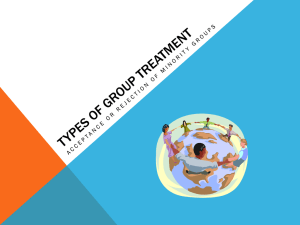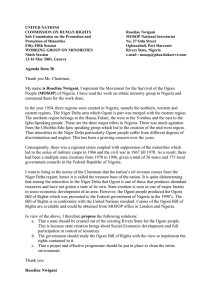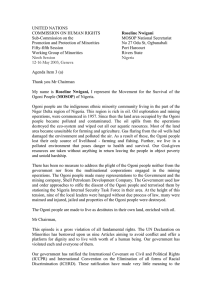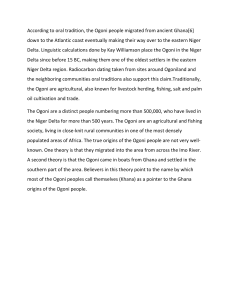THE COMMISSION ON HUMAN RIGHTS WORKING GROUP ON MINOIRTIES
advertisement
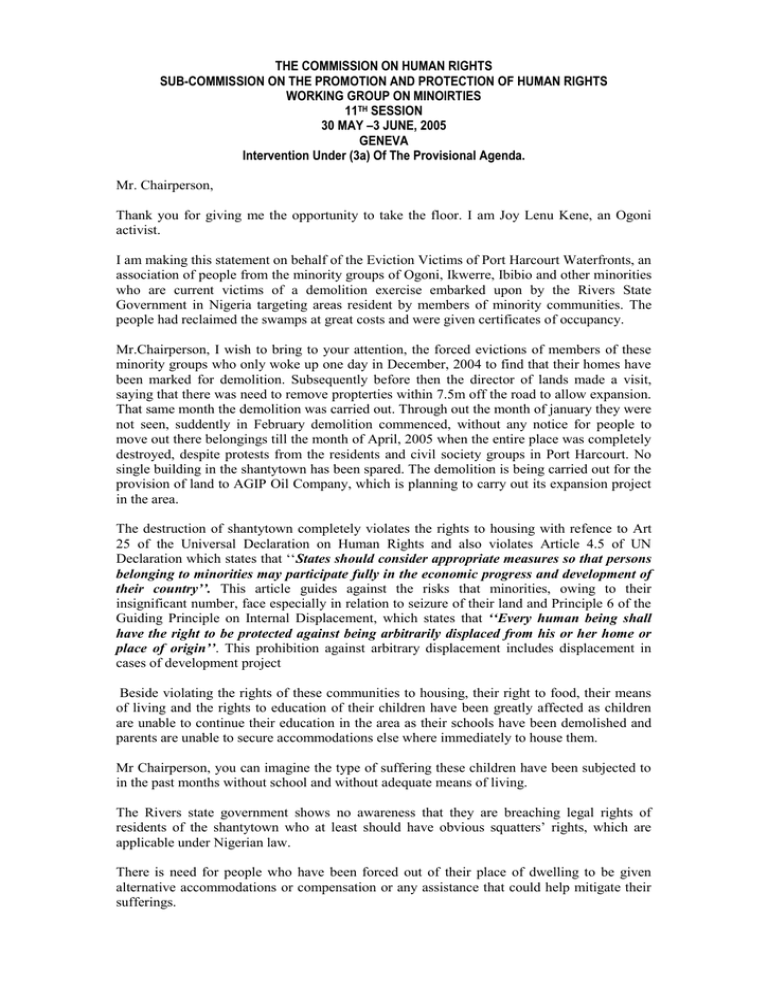
THE COMMISSION ON HUMAN RIGHTS SUB-COMMISSION ON THE PROMOTION AND PROTECTION OF HUMAN RIGHTS WORKING GROUP ON MINOIRTIES 11TH SESSION 30 MAY –3 JUNE, 2005 GENEVA Intervention Under (3a) Of The Provisional Agenda. Mr. Chairperson, Thank you for giving me the opportunity to take the floor. I am Joy Lenu Kene, an Ogoni activist. I am making this statement on behalf of the Eviction Victims of Port Harcourt Waterfronts, an association of people from the minority groups of Ogoni, Ikwerre, Ibibio and other minorities who are current victims of a demolition exercise embarked upon by the Rivers State Government in Nigeria targeting areas resident by members of minority communities. The people had reclaimed the swamps at great costs and were given certificates of occupancy. Mr.Chairperson, I wish to bring to your attention, the forced evictions of members of these minority groups who only woke up one day in December, 2004 to find that their homes have been marked for demolition. Subsequently before then the director of lands made a visit, saying that there was need to remove propterties within 7.5m off the road to allow expansion. That same month the demolition was carried out. Through out the month of january they were not seen, suddently in February demolition commenced, without any notice for people to move out there belongings till the month of April, 2005 when the entire place was completely destroyed, despite protests from the residents and civil society groups in Port Harcourt. No single building in the shantytown has been spared. The demolition is being carried out for the provision of land to AGIP Oil Company, which is planning to carry out its expansion project in the area. The destruction of shantytown completely violates the rights to housing with refence to Art 25 of the Universal Declaration on Human Rights and also violates Article 4.5 of UN Declaration which states that ‘‘States should consider appropriate measures so that persons belonging to minorities may participate fully in the economic progress and development of their country’’. This article guides against the risks that minorities, owing to their insignificant number, face especially in relation to seizure of their land and Principle 6 of the Guiding Principle on Internal Displacement, which states that ‘‘Every human being shall have the right to be protected against being arbitrarily displaced from his or her home or place of origin’’. This prohibition against arbitrary displacement includes displacement in cases of development project Beside violating the rights of these communities to housing, their right to food, their means of living and the rights to education of their children have been greatly affected as children are unable to continue their education in the area as their schools have been demolished and parents are unable to secure accommodations else where immediately to house them. Mr Chairperson, you can imagine the type of suffering these children have been subjected to in the past months without school and without adequate means of living. The Rivers state government shows no awareness that they are breaching legal rights of residents of the shantytown who at least should have obvious squatters’ rights, which are applicable under Nigerian law. There is need for people who have been forced out of their place of dwelling to be given alternative accommodations or compensation or any assistance that could help mitigate their sufferings. Sadly, Mr Chair, as I speak with you in this meeting, no restitution or compensation have been paid to the victims of this horrible act. Shanty town residents built schools, churches and provided almost everything for themselves and just in a twinkling of an eye, all was brought down. Members of this Working Group, another problem presently threatening the existence and survival of minority groups in Nigeria especially the Ogoni is the continued non-recognition and study of the Ogoni language and that of other minorities. This is a critical violation of our language rights, which has denied us of our essence and is leading to the dead of our culture and by extension, our extinction as a people. Mr.Chair, in the 1999 Nigeria’s constitution, there is no constitutional guarantees for the safe guidance and protection of the rights of minorities. The government claims that the principle of non-discrimination is emphasied in the constitution but I must say that this does not take care of the special situation of minorities in the country and the discrimination that they continue to face in the hands of the majority ethnic groups and collaborative multinational corporations causing environmental racism in Ogoni and the Niger Delta. While the government actively promotes the study of the majority languages of Hausa/Fulani, Yoruba and Igbo and gave it constitutional protection as it states in Section 55 of the 1999 Nigeria Constitution that: The business of the National Assembly shall be conducted in English and in Hausa, Ibo and Yoruba when adequate arrangements have been made therefore”, nothing is being said about speakers of minority languages. This same discrimination is reflected in the National Policy on Education where it states that ‘Apart from preserving the peoples’ culture, the Government considers it to be in the interest of national unity that each child should be encouraged to learn one of the three majority languages other than his own mother tongue. The government considers the three major languages in Nigeria to be Hausa, Igbo and Yoruba’ Mr. Chair, in respect of the above, I wish to make the following recommendations: 1.Since the WGM have proved that the protection and promotion of minority rights in the state contribute to state stability, I therefore call on the WGM to appeal to Nigeria government, Agip Oil Company and the Rivers state government to make alternative accommodation for the affected evictees and pay compensations. The Convention on the Rights of the Child (CRC) in Article 27 Section 3 obliges state parties to provide in case of need, material assistance to families particularly with regard to nutrition, clothing and housing. 2.The United Nations should declare cases of Forced Evictions as crimes against humanity. 3.The Working Groups should take serious steps to ensure that the Nigerian government amend the provisions of the land use act, which denies the right of ownership and participation of minorities in the management of land. 4. The Working Group should urge the Nigeria government to elaborate a National Policy on the Protection of Minorities and Minority Rights and appoint a minister/officer in charge of minority rights. 5.The Nigeria government should set up a process for the promotion of the study and use of all languages in schools irrespective of the ethnic group. Thank you Kene Joy Lenu Association of eviction victims of Port Harcourt Waterfront ,genlenu@yahoo.com

